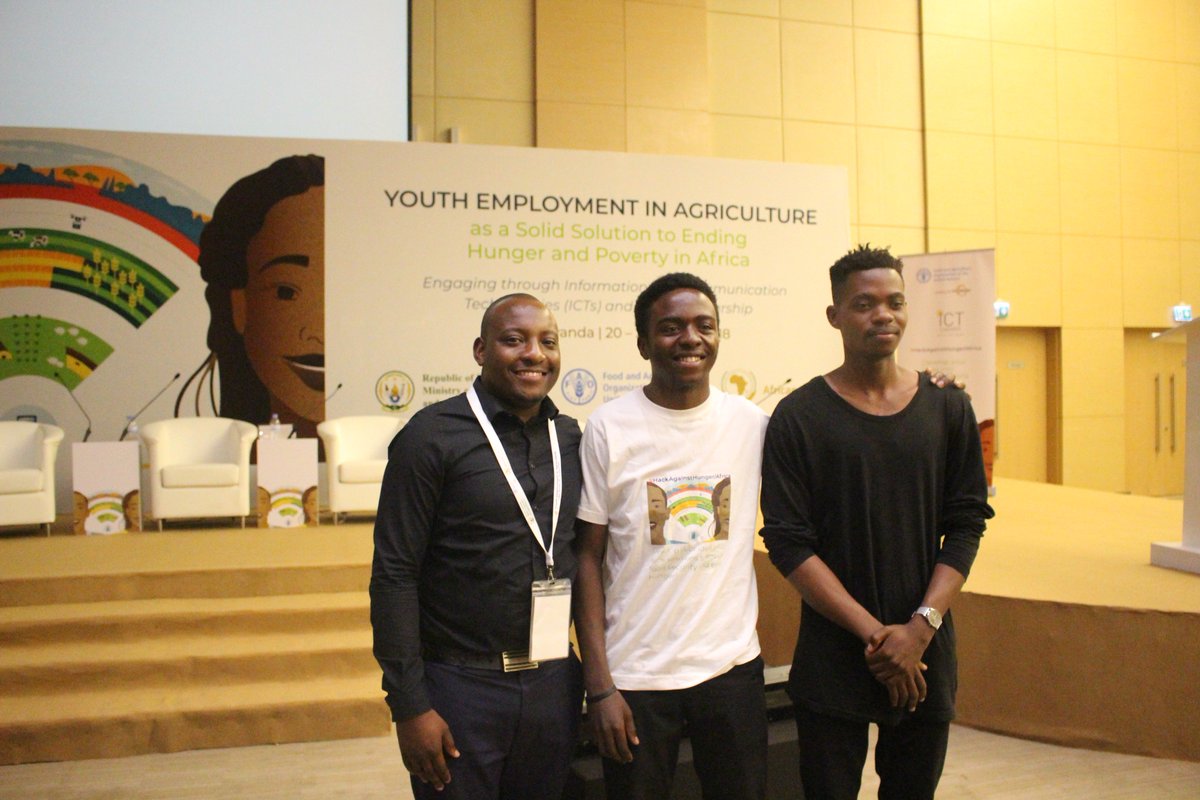20-21 August 2018. Kigali, Rwanda. Youth in Agriculture as a Solid Solution to ending Hunger and Poverty in Africa
Over sixty percent of Africa’s estimated 1.2 billion people are under the age of 25; yet with little job creation currently in the rural areas where the majority of the population resides, there is a growing uncertainty over the continent’s preparedness to tap this resource. Tens of millions of jobs will have to be created each year in rural areas for Africa to harness the dividends of this youthful population.
Considering agriculture as an essential driver of economic development and an area of great opportunities for young people in Africa, harnessing opportunities in agribusiness entrepreneurship and innovations, including in ICT innovations, along the value chains, contributes to improving the sector’s image, increases productivity and returns to investment and provides new employment opportunities, hence attracting more young people.
Extracts of the programme:
“Voice of the Youth” Special session on youth entrepreneurship
Several youths have successfully entered into agriculture, and serve as role models to fellow youths. The speakers shared their motivations, experiences, challenges and successes in engaging in the sector. Insights were also shared on how successful young entrepreneurs can be better supported to act as role models for their peers.
- Dieudonne Twahirwa, Founder, Gashora Farm Ltd, Rwanda
- Steve Ngunyi, Managing partner, icon (be one) Ltd, Kenya
- Lam Shumei, Founder, Poultry East Africa Ltd, Singapore
- Ruramiso Mashumba, Chairperson, Youth wing of Zimbabwe Farmers Union, Zimbabwe
- Flavien Kouatcha, Founder, Save our Agriculture, Cameroun
- Awa Caba, Co-founder and Chief Executive Officer, Sooretul, Senegal
- Olawale Rotimi Opeyemi, Founder, JR Farms Limited, Nigeria
Key capacities are required to enable youth to participate effectively in competitive agricultural value chains. For example, skills in certification schemes, which regulate some important markets are needed. Training entities and universities may consider setting up an advisory consulting service to provide entrepreneurs with the right information at the right time, particularly for youth who may not have a background in agriculture or business. Equally, Governments must establish and support well-designed and affordable training and mentorship to build the entrepreneurial skills of youth.
- Simunza Muyangana, representing the Technical Centre for Agricultural and Rural Co-operation (CTA)
- Teodorico Campos, Minister of Agriculture and Rural Development, Sao Tomé and Principe
- Kwesi Atta-Krah, Director for Country Alignment and Systems Integration, IITA Alemayehu
- Konde Koira, Rwanda Representative, MasterCard Foundation
- Beryl Agengo, Executive Coordinator, Global African Agribusiness Accelerator Platform
- Alex Ariho, Chief Executive Officer, Africa Agribusiness Incubation Network
- Rouffahi Koabo, Chief Executive Officer, Centre Incubateur des PME, Niger
- Octave Semwaga, Director General, Strategic Planning and Programme coordination, MINAGRI, Rwanda
Side events
Parallel to the main conference, there were three main side events:
#HackAgainstHunger/Africa
 19-20 August. Youth in Africa have the potential to revolutionize the food and agriculture sector and generate economic growth. FAO seeked innovative business models and new technologies to unlock the largely untapped reservoir of youth employment. Teams harnessed new technologies, received coaching from FAO and partner experts, and accelerated innovative ideas around youth-led and youth-focused entrepreneurship and employment. The top ideas were presented in pitches to a panel.
19-20 August. Youth in Africa have the potential to revolutionize the food and agriculture sector and generate economic growth. FAO seeked innovative business models and new technologies to unlock the largely untapped reservoir of youth employment. Teams harnessed new technologies, received coaching from FAO and partner experts, and accelerated innovative ideas around youth-led and youth-focused entrepreneurship and employment. The top ideas were presented in pitches to a panel.Eight teams competed in the hackathon. Among the proposed solutions were an app that links aspiring farmers with land owners in Senegal and a Nigerian mobile platform that uses blockchain to help farmers demonstrate their creditworthiness to lenders.
The winner was AgriPredict, an app already operating in Zambia that that can help farmers identify
diseases and pests - including the voracious fall armyworm, which eats crops and has wreaked havoc in much of sub-Saharan Africa.
- Farmers can access it directly from their phones or via Facebook. CEO Mwila Kangwa, 31, said the initiative came out of the twin disasters that hit Zambian farmers in 2016 - tuta absoluta, a tomato disease, and the fall armyworm.
- As winners, the Zambian team will receive coaching from the FAO to refine their product and an opportunity to meet potential funders and partners.
Virtual consultations
Prior to and during the conference, to ultimately involve more youth, a virtual consultation was set up through a youth in agriculture platform. The virtual consultation obtained inputs and views from the youth in the thematic areas and be engaged in the interactive sessions.
Exhibition of innovative products and services
An exhibition of innovative products and services for agriculture and rural development by youth and youth-led organizations from across Africa was organised, as well as a networking/match making space for the youth and potential investors.
The overall purpose of the event was to exchange lessons and experiences on the project since inception in 2016, how to strengthen it and increase its impact in beneficiary countries, and how to possibly replicate it in other countries.
- Fati N’zi Hassane, Head of Skills and Employment for Youth Program, NEPAD Agency
- Mr. Rouffahi Koabo, Chief Executive Officer, CIPMEN, Niger
- Mrs. Hannah Enanga Ewoke, Director, Regional Multipurpose Youth Training Centre, Cameroon
- Mr. Pearson Soko, Ministry of Agriculture, Irrigation and Water Development, Malawi
- Mr. Tobie Manga Ondoa, Ministry of Agriculture and Rural Development, Cameroon
- Mr. Vincent Oparah, Project Manager, NEPAD Agency
- Female Youth
- Male Youth
- Synthesis - Mrs. Estherine Fotabong, Director PICD, NEPAD Agency
Video coverage:





No comments:
Post a Comment